#recursive narrative
Explore tagged Tumblr posts
Text
“The universe will be ripped apart if you talk to your past/future self” Boring. Me, my 12-year-old self, and my 45-year-old self have been working on our shared trauma together and we all think you’re cringe
#time travel isn’t real! fuck ethics I want to explore recursive questions of the self#and to use a very literal proxy for healing the inner child#i find it to be THEE most interesting use of time travel and it’s so often written out as an impossibility#i understand it can fuck with your larger unrelated narrative but have you considered. i love it
186 notes
·
View notes
Text
everything related to cognition and human engagement just makes so much sense everything man-made is just so easy to break into reducible components it’s all rhetoric and construction it’s sooo interesting
#my ramblings#narrative is the understanding and expression of life yknow??? it’s recursive by the inherent nature of needing an interpretive tool etc
5 notes
·
View notes
Text
It matters which stories tell stories, which concepts think concepts ... which systems systematise systems.
Donna Haraway
24 notes
·
View notes
Text

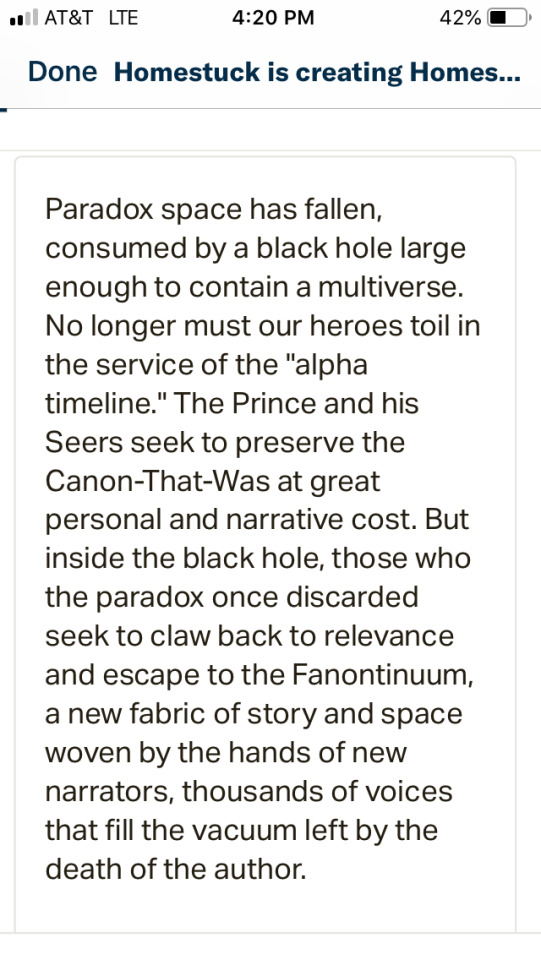
i love this narrative in its entirety
#they just keep doing it to me#everystep is just as gorgeous as the last#and each new narrative format has its one unique vibe#i love it so much because theyre just able to address the content they create at the same time being able to give so much dimensionality#we finally will get to learn about the characters that were just discarded#we ge to learn so much if we want to#homestuck has always had a multiverse#was saw it in the dream bubbles#but now we get to see more of what multiverse outside of paradox is like#its so beautifully recursive without being truly repetitive and that takes talent#you certainly dont have to love or even like every version of the multiverse#thats kind of the point#but the universe in its whole is impressive and amazing non the less because of it#homestuck 2#homestuck beyond canon#homestuck^2#i think its great#try reading it if youre up for it#find it at homestuck2.com
2 notes
·
View notes
Text
I get variations on this comment on my post about history misinformation all the time: "why does it matter?" Why does it matter that people believe falsehoods about history? Why does it matter if people spread history misinformation? Why does it matter if people on tumblr believe that those bronze dodecahedra were used for knitting, or that Persephone had a daughter named Mespyrian? It's not the kind of misinformation that actually hurts people, like anti-vaxx propaganda or climate change denial. It doesn't hurt anyone to believe something false about the past.
Which, one, thanks for letting me know on my post that you think my job doesn't matter and what I do is pointless, if it doesn't really matter if we know the truth or make up lies about history because lies don't hurt anyone. But two, there are lots of reasons that it matters.
It encourages us to distrust historians when they talk about other aspects of history. You might think it's harmless to believe that Pharaoh Hatshepsut was trans. It's less harmless when you're espousing that the Holocaust wasn't really about Jews because the Nazis "came for trans people first." You might think it's harmless to believe that the French royalty of Versailles pooped and urinated on the floor of the palace all the time, because they were asshole rich people anyway, who cares, we hate the rich here; it's rather less harmless when you decide that the USSR was the communist ideal and Good, Actually, and that reports of its genocidal oppression are actually lies.
It encourages anti-intellectualism in other areas of scholarship. Deciding based on your own gut that the experts don't know what they're talking about and are either too stupid to realize the truth, or maliciously hiding the truth, is how you get to anti-vaxxers and climate change denial. It is also how you come to discount housing-first solutions for homelessness or the idea that long-term sustained weight loss is both biologically unlikely and health-wise unnecessary for the majority of fat people - because they conflict with what you feel should be true. Believing what you want to be true about history, because you want to believe it, and discounting fact-based corrections because you don't want them to be true, can then bleed over into how you approach other sociological and scientific topics.
How we think about history informs how we think about the present. A lot of people want certain things to be true - this famous person from history was gay or trans, this sexist story was actually feminist in its origin - because we want proof that gay people, trans people, and women deserve to be respected, and this gives evidence to prove we once were and deserve to be. But let me tell you a different story: on Thanksgiving of 2016, I was at a family friend's house and listening to their drunk conservative relative rant, and he told me, confidently, that the Roman Empire fell because they instituted universal healthcare, which was proof that Obama was destroying America. Of course that's nonsense. But projecting what we think is true about the world back onto history, and then using that as recursive proof that that is how the world is... is shoddy scholarship, and gets used for topics you don't agree with just as much as the ones you do. We should not be encouraging this, because our politics should be informed by the truth and material reality, not how we wish the past proved us right.
It frequently reinforces "Good vs. Bad" dichotomies that are at best unhelpful and at worst victim-blaming. A very common thread of historical misinformation on tumblr is about the innocence or benevolence of oppressed groups, slandered by oppressors who were far worse. This very frequently has truth to it - but makes the lies hard to separate out. It often simplifies the narrative, and implies that the reason that colonialism and oppression were bad was because the victims were Good and didn't deserve it... not because colonialism and oppression are bad. You see this sometimes with radical feminist mother goddess Neolithic feminist utopia stuff, but you also see it a lot regarding Native American and African history. I have seen people earnestly argue that Aztecs did not practice human sacrifice, that that was a lie made up by the Spanish to slander them. That is not true. Human sacrifice was part of Aztec, Maya, and many Central American war/religious practices. They are significantly more complex than often presented, and came from a captive-based system of warfare that significantly reduced the number of people who got killed in war compared to European styles of war that primarily killed people on the battlefield rather than taking them captive for sacrifice... but the human sacrifice was real and did happen. This can often come off with the implications of a 'noble savage' or an 'innocent victim' that implies that the bad things the Spanish conquistadors did were bad because the victims were innocent or good. This is a very easy trap to fall into; if the victims were good, they didn't deserve it. Right? This logic is dangerous when you are presented with a person or group who did something bad... you're caught in a bind. Did they deserve their injustice or oppression because they did something bad? This kind of logic drives a lot of transphobia, homophobia, racism, and defenses of Kyle Rittenhouse today. The answer to a colonialist logic of "The Aztecs deserved to be conquered because they did human sacrifice and that's bad" is not "The Aztecs didn't do human sacrifice actually, that's just Spanish propaganda" (which is a lie) it should be "We Americans do human sacrifice all the god damn time with our forever wars in the Middle East, we just don't call it that. We use bullets and bombs rather than obsidian knives but we kill way, way more people in the name of our country. What does that make us? Maybe genocide is not okay regardless of if you think the people are weird and scary." It becomes hard to square your ethics of the Innocent Victim and Lying Perpetrator when you see real, complicated, individual-level and group-level interactions, where no group is made up of members who are all completely pure and good, and they don't deserve to be oppressed anyway.
It makes you an unwitting tool of the oppressor. The favorite, favorite allegation transphobes level at trans people, and conservatives at queer people, is that we're lying to push the Gay Agenda. We're liars or deluded fools. If you say something about queer or trans history that's easy to debunk as false, you have permanently hurt your credibility - and the cause of queer history. It makes you easy to write off as a liar or a deluded fool who needs misinformation to make your case. If you say Louisa May Alcott was trans, that's easy to counter with "there is literally no evidence of that, and lots of evidence that she was fine being a woman," and instantly tanks your credibility going forward, so when you then say James Barry was trans and push back against a novel or biopic that treats James Barry as a woman, you get "you don't know what you're talking about, didn't you say Louisa May Alcott was trans too?" TERFs love to call trans people liars - do not hand them ammunition, not even a single bullet. Make sure you can back up what you say with facts and evidence. This is true of homophobes, of racists, of sexists. Be confident of your facts, and have facts to give to the hopeful and questioning learners who you are relating this story to, or the bigots who you are telling off, because misinformation can only hurt you and your cause.
It makes the queer, female, POC, or other marginalized listeners hurt, sad, and betrayed when something they thought was a reflection of their own experiences turns out not to be real. This is a good response to a performance art piece purporting to tell a real story of gay WWI soldiers, until the author revealed it as fiction. Why would you want to set yourself up for disappointment like that? Why would you want to risk inflicting that disappointment and betrayal on anyone else?
It makes it harder to learn the actual truth.
Historical misinformation has consequences, and those consequences are best avoided - by checking your facts, citing your sources, and taking the time and effort to make sure you are actually telling the truth.
15K notes
·
View notes
Text
Not gonna lie, with the Spot’s upcoming time mucking shenanigans as suggested by the flashes of the future in Miles’ vision, I would not be surprised if the dimensional collapsing theorized by Miguel to come from averting too many “Canon Events” will turn out to be a side effect of something the Spot will either do himself or set up to screw with Miles.
Particularly, with how much his origin monologue to Miles and Jeff centered around the idea that he made Spider-Man and vice versa, note how incredibly well that mentality would dovetail with Miguel and the Spider Society’s belief that the “Canon Events” are what made them Spider-Man.
@kindaorangey has a good post pointing out how the Spot’s mindset of “filling the hole with more holes” is a pretty apt metaphor for the way Miles, Gwen, and likely the other spider people diving into the identity of Spider-Man as a crutch for dealing with the isolation caused by said identity, but suffice to say, OP and @sir-adamus had these tags which I'd like to use as a jumping pad:


For this, we can analyze Miguel and Spot as two sides of the same coin, where Miguel’s side is about allowing canon events to play out through inaction, and Spot's side could potentially lead up to (as a side effect of his grudge against Miles) actively ensuring that only those canon events happen, with any deviations that don't fit into their views being cast aside.
The former position projects personal traumas as absolutely necessary and destined to happen onto others, the latter position rejects any possibility that things could go differently in a quite literal manner. But in the end, both ultimately are about "filling in the hole with more holes" and dictating what Miles "should" be like.
Miguel doesn’t think Miles is a real Spider-Man and that him becoming Spider-Man was a mistake that never should have happened, all from his obsessive mentality surrounding Canon Events. He and by extension the other Spider-Men stuck in their hole of guilt and fatalism, surrounding themselves with other Spider-Men stuck in their holes of trauma and grief to where they have formed an echo chamber that tells them Miles cannot save his father's life and that they cannot do anything to save people anymore.
And in the Spot's case, the metaphor already came from him, but it's all about obsessively centering his new, lonely existence around being not just A, but THE nemesis to Miles' Spider-Man. He lost everything and has nothing except his connection to Spider-Man. To fill that hole, he's not only only making himself a villain that Miles will actually respect. He's going to try his damnedest to make sure that Miles reaches his full potential as Spider-Man just like he talked about in Mumbattan, and fill the hole with more holes in Miles' life until Miles is devoid of everything except the Spot.
Given the flashes of future events in Miles’ vision, if and when the Spot inevitably hears about Miguel's theory of Canon Events, it would only be fitting if the Spot retroactively becomes responsible for all the previous dimensional destruction the Spider-Society dealt with. And thus, Miguel's theory obsession would be its own recursive creator.
A vicious cycle of telling themselves that things have to happen a certain way, of blaming uncontrollable circumstances on something they think they can and should control, and of refusing to let go of the spiral they've fallen into.
After all, Miles already had an Uncle Ben-type event and the Spot is trying to set up a Captain Stacy-type event. Since the logical conclusion to the themes of Miles choosing what kind of Spider-Man he wants to be and not allowing preventable tragedies to happen would be that Jeff lives, well…
It would only be narratively fitting for the Spot to try to set up a Gwen Stacy event later down the line.
Because if Miles being bit and the Spot getting caught up in the collider wasn't destiny, if the intersection of their lives was simply due to circumstances they had no control over, if the dimensional collapses weren't because preventing Canon Events is inherently destabilizing to reality in of itself, then Miguel and the Spot would have to look inwards and actually try to figure out how to fill the holes in their lives.
So Miguel tells himself that what he does has to be done, that only he is strong enough to do it, and that everyone should follow his lead and stop caring.
As for the Spot?
If he fails to kill Jeff and Gwen, and when it's proven to everyone else that Canon Events are not required lynchpins of reality like Gwen found, he might just decide to try to make them actual lynchpins across time and space.
Or at least, making it so that the only realities that can exist are ones where those events happen.
Aka trying to forcibly changing the multiverse so suffering huge tragedy becomes an inherently integral part of Spider-Man the concept, rather than a mere possibility. So many Spider-Men and their dimensions getting hurt in the crossfire, and all in the process of targeting Miles Morales specifically.
Truly, it would be quite resonant if and when the Spider-Society let and help Miles get to save his Captain and Gwen Stacy. Beating the Spot would no longer be about the concept of stopping a threat to the multiverse and their canon events, but about metaphorically ending the cycle of suffering and finding a way to move forwards beyond the guilt. They probably can’t actually change the past, but with this, they can fight to prevent it from happening to others.
#across the spiderverse#across the Spiderverse spoilers#atsv spoilers#spiderverse theory#across the spider verse spoilers#spider man: across the spider verse#across the spider verse#gwen stacy#miles morales#the spot#spiderverse meta
552 notes
·
View notes
Text
I'm watching the new matrix and I'm CACKLING at how much of a 'blow me' the entire narrative is towards WB
#we love a meta narrative#we love recursive stories#im only 20 minutes in so we'll see if the amusing elements carry forward
1 note
·
View note
Text
Concise Guide to Developing a Neuroscience Based BBC Sherlock Holmes Esq Mind Palace
Following is a condensed and concise guide for you to develop similar sorts of mental mastery as Sherlock displays in the amazing British interpretation of Sir Conan Arthur Doyle's beloved character. I use this mind map everyday for basically everything and I don't think that there is any area of my life that hasn't been improved in someway by engaging with its mechanics.
This mindmap was designed to be useful in almost all life circumstances and there is a great deal of flexibility and modifications that can be made to its use to be tailored to your own particular needs to maximize utility and functionality
The key to this system is that there are six main inputs of which all you have to do is think of one of the six directions in orthogonal Euclidean space. I chose each direction in correlation to the general theme of the cognitive heuristic that you want to "activate" with the general function of the region of (the majority) of peoples brain has somewhat localized centers dedicated to said cognitive pattern.
The labelling of these directions is arbitrary and feel free to define your own characterization or order of inputs however I just listed my ontology as is I use it IRL.
+z/-z -> 1, 2 (or forward/back) respectively
-x/+x -> 3, 4 (or left/right) respectively
-y/+y 5, 6 -> (pr down/up) respectively
It is key to keep in mind of your mind that -z is essentially just the direction that your eyes face as set in your skull for a point of reference.
Below is a table summarizing these inputs along with a brief description of each directions psychological and cognitive theme
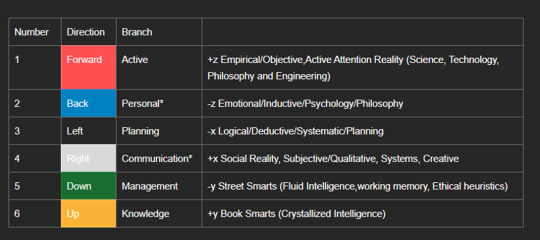
Each "direction" can be further broken down by applying the six inputs again which results in six main branches and thirty six sub branches, the initial thematic aspect behind the choice of the first six inputs are extrapolated and carried through into the assignment of the sub set of the thirty six sub branches so there is a degree of logical organization of the resultant four dimensional meta cognitive structure (four dimensions as inputs will be repeatedly done temporally as needed)

The mental representation of the MM will look like the image above with the caveat that in all Euclidean directions, there would be an addition MR unit facing out of each plane which would be 1, 1/2, 2/3,3/4,4/5,5/6,6 respectively. Also inputs that "bounce back" such as 1, 2/2,1 3,4/4,3 and so on are considered to be unique inputs as its the pathing and tracing out of these inputs mentally which acts non-combinatory to result in a total of thirty six unique sub branches.
There may be a lot of unfamiliar terminology, especially acronyms which I have developed just mostly for my own use before I decided to put this memeplex out into cyberphysical reality, if there are any terms or concepts that anyone is unsure about feel free to ask but I am going to define everything in Unsignificant Sentience eventually.
Key to understanding and using this list is that each integer corresponds to one pole of a base Euclidean axis
One: active
1 1 Sense, Attention and Action (Non-selective/Selective and/or Undirected/Directed Attention), AAPM (Active Attentional Perception Model)
1 2 Perceiving, Observing, and Introspection, SVD
1 3 Logic, MM Model Axioms and Experimentation, ISR, EGC Outcomes
1 4 Assessment Describing, +y/MR/ME EIOSA Modelling
1 5 CBT, BH, Working Memory
1 6 Specific Thinking, Frame Encoding, and MEs Applications and Management (Inter branch/Sub Branch)
In your minds eye the pathing thought trace input should result in something like this.
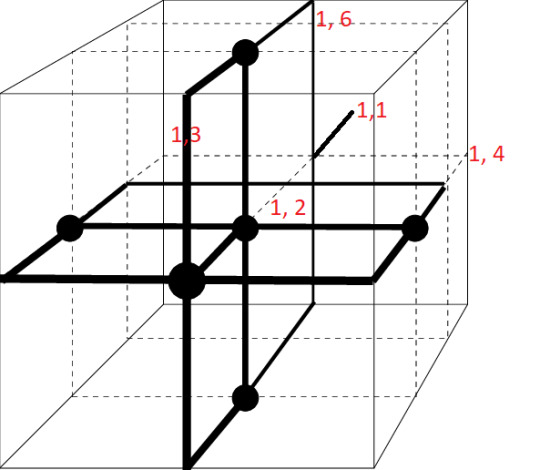
Two: personal
2 1 All Current Recursive Conscious Perception (EIOSA Analysis/Awareness)
2 2 Narrative, Identity Management, Frames, Auxiliary SA/EMA, Qualia
2 3 R4, ME, (in vivo UJF Functionality/Integration)
2 4 Beliefs, Values, Hopes, Ethics, Dreams (+DRD4 content)
2 5 Memory, Mnemonics, AE Encoding and Recall
2 6 Consciousness + VSM/UJS Models, Influencers (5 x) and CT Management CTx PPF, PQ
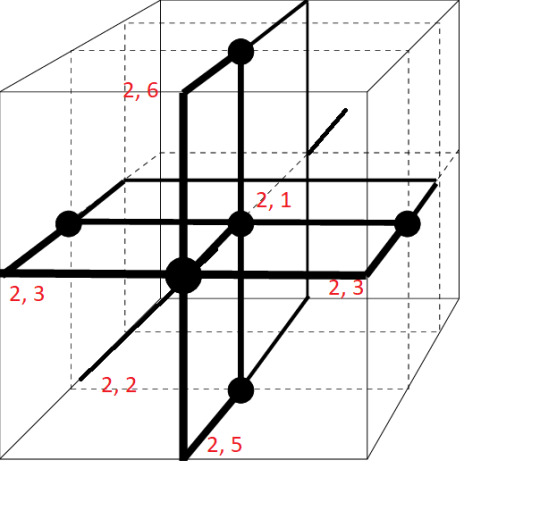
I will only fill out one more guide for the inputs for the Third Branch as it should be pretty easy to extrapolate the pattern by this point
Three: planning, logic, and structure
3 1 Dynamic Planning and Situational Awareness, (ME0002)
3 2 Skills and Technical Application/Adaption/Singular Module: Heuristic Focus
3 3 Active Goals and Projects/Schedule, Mnemonics
3 4 Habits/Predispositions/Routines/Baselines (SETS, Blooms Taxonomy) and limitations, Re (self-imposed and/or Real Boundaries), Frames and Physiological/Psychological Patterns
3 5 Resource Management
3 6 Ideas or Future Goals and Projects/Personal Engineering, USF, CMM, NWF
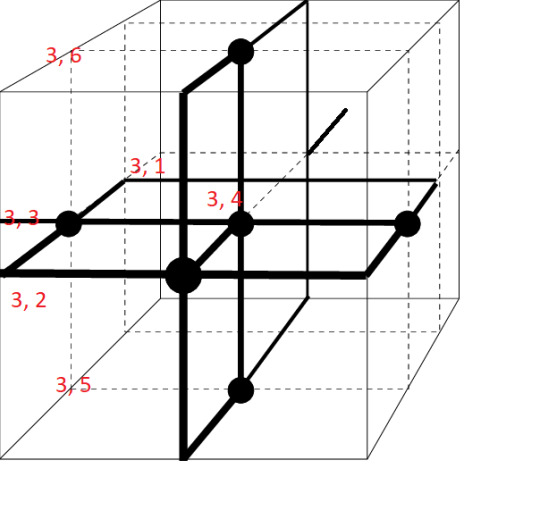
Four: Systems, Creative, and Communication
4 1 Agent Based, Observance and Interaction with Systems Associated and Context Awareness, ToM EIOSA
4 2 Persona and Ego Management
4 3 Reality, Social and Communication, Systems Identification/Interaction/Alteration/Mechanisms Options, Sets/OMA7, Objective EI IRL Network Corresponding to Meta Frameworks
4 4 MR/ME Grids + Practice/Enactment In Vivo
4 5 Communication and Sapir Whorf Language Management, Social Analysis and Responses
4 6 Ontology and Frame Engineering, Perspective Theory
Five: health
5 1 Physical Health (ER AnE + Diet/Hydration/Sleep/Medication)
5 2 Mental Health (ME0005/ME0010 Checks and Reconciliation)
5 3 Self Management and Contingencies
5 4 State of Other Systems, EISOA x, x,, (MR of Self Same) (States in Regards to Meta-Systems)
5 5 Applied Mindful Meditation, Self Awareness (Recursivity), and Reality Checking, PQ
5 6 Cognitive Health (DRD4 quality + CIA quality)
Six: knowledge
6 1 Technology
6 2 Philosophy
6 3 Engineering
6 4 General/Cultural
6 5 Frameworks
6 6 Science
Viable System Model based MM systems
The viable system model is a cybernetic theory and model utilized to model entities so that they remain viable and resilient in the fact of change. The model itself was derived from the physiological evo psych based compartmentation of function present in the human brain. I am going to do a post on VSMs at some point but the Wikipedia link is there if anyone is interested.
Below is a rough guide to what MM outputs correlate to each system in a viable system model
System One: 1 x , 3 3, 3 5, 6 x
System Two 2 1-3
System Three 3 1-3
System Four 4 x, 5 x, 6 x
System Five 2 4-6, 3 4-6
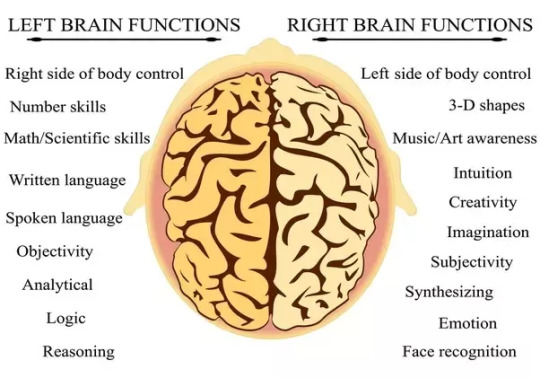
As shown by this highly scientific diagram, there is a general localization of specific cognitive and mental phenomena associated with each hemisphere and I hope that on some level that the mental action of enacting an input to the corresponding area of the brain that is more generally specialized in carrying out that processing might improve the effectiveness and/or efficiency of that given task. I would love to get an hold of an EEG and do some digging but that is a future project
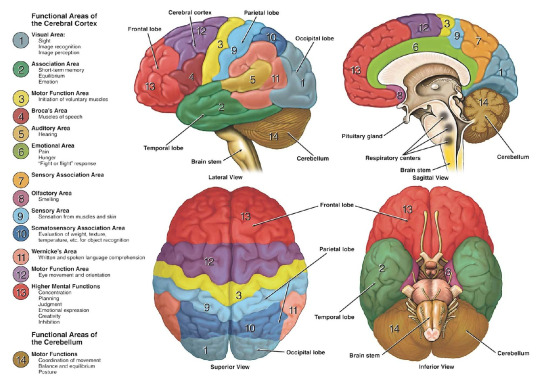
So aside from forcing 42 specific commands into your brain, let alone the time required to practice utilizing this mind map in vivo, there is unfortunately another set within the +y knowledge branch where each domain of knowledge has ten subsets in order to break down learning and assimilating new information into more discrete chunks in order to facilitate recall and synthetizing of a priori knowledge.

This is one module of many such systems I have developed to try to be able to reproducibly able to self actualize on a daily basis.
There is an ungodly amount of extra details and systems that I have curated, developed, and refined regarding the MM and some of them are evident in some of the seemingly occult acronyms scattered throughout this document.
I was going to create an ARG game for later on in this year of 2023 after I finished the Unsignificant Sentience trilogy and I was going to make mechanics such as this MM part of the way to play the ARG and to get players immersed in the world building but I just want to get some of my ideas out there as I have been working on too many projects in a vacuum
I am done screaming into the void
#neurodivergencies#life hacks#mind map#psychology#geek#writing#sherlockbbc#mind palace#unsignificant sentience#neuroscience#science#physics#a guide to disgusie#cybernetics#biology
119 notes
·
View notes
Text
The hilarious part about Faith and how incredibly gay she comes across is that it's all a natural side-effect of her intended narrative role. According to Whedon she wasn't intentionally written to be a queer or even queer-coded character, but the way she is written and her metaphorical function necessarily meant she came across as queer-coded. I'll explain what I mean:
1) As Buffy's shadow, Faith is meant to be symbolic of Buffy's repressed desires, and specifically her frustrated sexuality. Buffy is dealing with imposed chastity throughout S3, first with her trauma over Angel getting in the way of a relationship with Scott, and then the curse preventing her from being physical with Angel. It's the centre point of Enemies, its touched on in Amends, and is one of the reasons they break up. There's a reason the season climaxes with Angel and Buffy in a passionate embrace, making orgasm faces as he 'penetrates' her. It's a whole season of sexual frustration for Buffy.
Faith needs to be constantly reminding Buffy of the thing she can't have - sex. She needs to talk about sex to Buffy - and she does, extensively. Faith is written as a very sexual person in general, but it's specifically and disproportionately aimed towards Buffy, because that's her narrative role. So you end up with this character who is constantly going around like "hey Buffy do you like sex? you should think about sex now. sex. when I'm on screen the main thing on your mind should be sex and having it". Which begs the question - why does Faith want Buffy to have sex? Symbolically, it's because she represents part of Buffy, and Buffy wants to have sex. But on a pure character level... what is the explanation? What is motivating Faith to constantly talk about sex to Buffy? A few instances you can write off as her making Buffy uncomfortable for jokes, but not all of them. How it comes across is that Faith has some sexual interest in Buffy, and is probing for her feelings.
2) Faith is a Seductress. That's not a comment about her character, that's her function in the story. She is the version of Buffy who goes down a darker path, and is trying to seduce her into doing the same thing. Part of Buffy's arc in S3 is resisting this temptation, and the symbol of what she is resisting is Faith. So Faith must be an enticing, seductive figure. To quote Passion of the Nerd's review, if Faith is there to to tempt Buffy into a moral dark side, it only makes sense that she is, well, tempting. The seduction is happening on many levels.
Faith is more or less filling the Femme Fatale archetype: the seductive, sexual figure who leads the Hero off their path. It's a trope you see all the time in male-led stories, going back to goddamn The Odyssey. Buffy as a character was invented as a simple gender-swap of an old horror trope, and part of the appeal of the show is that she gets to fill the role of The Hero as a woman. So what happens when you gender-swap The Hero and don't gender-swap the Femme Fatale? You get a gay story, that's what.
3) The Faith arc of S3 is a recreation of the Angel arc of S2. It is structured in the exact same way, with the two having a push-and-pull in the early parts of the season, a setback in their relationship in episode 7, getting closest again mid-season before a night of passion that ends in sudden tragedy. Angel/Faith then turn to the dark side, become the Big Bad, and show that they are beyond saving in episode 17. The season ends with Buffy having to fight and the kill them in order to save others. This is all an intentional recycling, as part of the show building up the Trolley Problem and the idea of Buffy being a killer, repeatedly escalating it to get us to The Gift. What this means is that Faith steps into the role that Buffy's love interest played in the previous season. This is the story that we have just had told to us as a tragic love story. We see it again, and guess what? It's still a tragic love story. Only now Faith is in the role of the love interest.
4) Part of the conflict surrounding Buffy and Faith is Buffy's fear of being "Single White Female'd". She fears Faith might steal her loved ones, and Faith does threaten that. She gets along with her mother, her friends... but most of all, her love interests. Buffy's fear of being replaced manifests as Faith trying to literally seduce away anyone romantically linked to Buffy. Angel, Scott Hope, Xander, later Riley, Spike, Robin Wood... Faith is comprehensively and exclusively attracted to men that Buffy dated. I'm honestly surprised she didn't find Owen and Parker from somewhere for a night in the sack. Again, this makes perfect heterosexual sense from a symbolic point it view - she threatens to take Buffy's place in the narrative, so she takes her place in relationships - but on a character level it becomes ambiguous. Is she actively trying to replace Buffy? Or is she trying to stop Buffy dating anyone for another reason? The simple fact is, there is exactly one common denominator with all of Faith's romantic entanglements: Buffy.
It's a canonical aspect of Faith's character that she is jealous of Buffy. We see that made explicit in Enemies - she's jealous of everything Buffy has: her family, her comfortable home life, her friends, her narrative standing, and of course her loving partners. So of course Faith displays jealousy whenever Buffy is involved with a guy. It's a necessary part of building Faith as this figure of Want and Envy. But how it plays out on screen isn't that Faith is jealous of Buffy because she wants these other guys - of course not, because we see her look jealously through the window at Buffy and Riley in This Year's Girl and Riley obviously means nothing to her. Rather, it very much appears that she is jealous of these other guys, because she wants Buffy.
There's also the added bonuses that come from the show playing with so many metaphors, that sometimes they cross in interesting ways. One of Faith's main purposes is to celebrate being a Slayer, and to encourage the same in Buffy. She wants Buffy to accept and embrace being a Slayer. Here, Slayerhood is standing in for independence and hedonism and making your own rules, all the things that Faith is encouraging. But one of the many other metaphors used is the 'coming out' metaphor. "Have your tried not being a slayer?" "It's because you didn't have a strong father figure isn't it." "I've tried to march in the Slayer Pride parade." It's a note that's hit really hard specifically around the time in the show that Faith is introduced. So if you carry this metaphor on, then Faith becomes an out-and-proud lesbianSlayer, trying to convince Buffy to accept and embrace her sexuality.
And it has a recursive effect too. All this stuff contributes towards Faith feeling like a very queer character. And Faith, of course, is Buffy's shadow self, meant to represent her unconscious desires. So when the symbol of your unconscious desires is so lesbian-coded, then the implication becomes that one of your unconscious desires is lesbian desire. Faith's existence as a part of Buffy implies the existence of Buffy's bisexuality. Which contributes to the relationship feeling ever more queer, which makes Faith even gayer.
I find this absolutely hilarious, because the queer subtext was never intended. Joss Whedon apparently was annoyed that people read this into their relationship, and the commentary from the other writers that does address it tends to point to Dushku's performance. And yeah, she is definitely leaning into that in her portrayal. But the main reasons that so many people have this reading all come from the writing. It's all stuff that is integral to the point of her character. Every metaphor and function in the narrative, every symbolic purpose she has, none of it was meant to be gay and yet it all leads directly to Faith appearing to be totally and completely gay. The queerness is accidental and unavoidable. And I just find that really fucking funny.
4K notes
·
View notes
Video
tumblr
Recursive Ruin is a mind-bending narrative-driven puzzle adventure set within an infinite recursive fractal world!
Read More & Play The Beta Demo (Steam)
#Gaming#indie games#Recursive Ruin#GIF#GIFS#video games#pc games#pc gaming#indie gaming#Recursive Ruin game
913 notes
·
View notes
Photo








Liminal
*Adj: Ambiguity or disorientation that occurs in the middle stage of a passage.
**Being: Those that cannot easily be placed into a single category of existence, naturally ambiguous, challenging the cultural networks of social classification.
'Liminal' is a new series of 7 gifs created in 12h using the same grayscale gradient in different angles to suggest myself a kind of 'landscape' (check last gif), to add later some figurative elements for the recursive narrative.
7 pieces minted at Objkt.
93 notes
·
View notes
Text
something. something. the girl who fell through the world, the underground child. what’s your title, what’s your purpose. (“the title always reveals itself at the right time.” -> the girl who fell through the world reveals herself at the right time?) heroes, a eulogy. you can’t turn back time. (<- maybe another point in favor of jaune not being de-aged, especially as he’s already ‘died;’ alice very much cannot save the white knight using the watch, that’s the point. & it’s about confronting her fear of loss. everyone’s afraid of something, that’s how you know you love, if you’re afraid of losing.) “we wait” becomes “why wait?”—i could almost see an argument for jaune dying from this, but jaune is literally the knight and his narrative, symbolic death has already happened. hm. there’s a lot of symmetry here though with “for the people we haven’t lost yet,” all we have is here and now, the future can’t change the past. ooh, also, “time was running out and you were running late; you were due a good twenty or thirty years ago,” there’s some dots to connect between jaune and stetson. it’s similar to ruby’s holographic alice-and-chloe setup and like, i think there’s maybe something to the fracturing of alice like this. jaune the weary skeptic who feels helpless to help himself. ruby the little girl who grew up too fast and needs to find her way back to herself. notably, neither of them is the dreamer of the dream. and the cat is a chloe whom alice left behind, clawing their way into the hatter. the queen of hearts exiles the hatter, alice reaches out to say come home to me. rwby’s allusion to this narrative is recursive, tripling in on itself (…houston, the tryout, broadway. three very different variations on the same story. question mark.). there’s a chloe without an alice who is also the hatter, and the queen of hearts isn’t here yet. there’s an intuitive sort of sense to the queen of hearts also being the alice who dreamed the dream. (& of course the cat’s mother would be the queen of hearts; they’re the heart of the ever after.) the hatter lures both the queen and alice through the looking glass using chloe as bait. now all that’s left to erase is dear alice and the queen. alice becomes a queen by making it to the eighth square—i almost hate how well the pieces fit together. it feels almost too good to be true. but fuck me if it doesn’t tie itself off with a neat little bow.
#rwby v9 spoilers#thinking aloud.#mentally composing the thesis i’ll write if this pans out because holy shit.
23 notes
·
View notes
Text
The thing about cobra kai is that it has two things that appeal to me greatly and one of them is that it has “revival/sequel stuck up its own ass syndrome” which is what happens when a franchise is so obsessed with quoting and recreating itself within itself that it creates, say it with me now, a recursive narrative loop in which the characters are stuck going through the same actions and lines and story beats and nothing can ever change because they just pass it on to their children who will pass it on to their children in the inevitable cobra kai reboot entitled eagle fang. You can’t escape the past when it’s waiting right around the corner to be the season ending cliff hanger. “You’re gonna regret this when it’s over // Yeah, right. Like this will ever be over” is the show’s thesis and I eat that shit up. The other thing is of course the swingers.
74 notes
·
View notes
Text
Remidyal's Fic Masterpost
A full list of my current fics, assuming I remember to update this post and pin it!
I love people doing derivative works and give blanket permission for any non-commercial art, podfic, etc SO LONG AS you do not use an AI or machine learning tool. Also, please link it to me because I wanna see.
Dimension 20 stuff:
Long fics:
Lunacy is my longest fic (at the time of writing this, about 180k words), an in-progress Adaine (and, particularly later, Aelwyn) focused fic in which Adaine fails her con save and becomes a werewolf. Similar overall in tone to the original, Lunacy strives pretty hard to be largely canon compliant from that divergence point, other than things that just are mostly changed for narrative needs. A heavy focus on Adaine (and again, later, Aelwyn) finding a family. There's two other works in the series; one is a short fic that was a draft oneshot of the core idea, the other is some supplemental material and missing scenes.
This thing is my baby and if you make art or recursive fic of it I will love it and you.
Missing is another in-progress long form fic, this one with Aelwyn as the main character and Adaine in the secondary role. This one is much less canon-compliant than Lunacy; the Abernant parents start on physical abuse sooner than they do in canon, and Aelwyn is a little bit braver and runs away, taking Adaine with her. Generally will have shorter chapters than Lunacy and definitely won't be going 250k words the way Lunacy probably will by the end.
Oneshots and short series:
Most of these are in the 1k-2k word range.
Fantasy High:
Poison and its sequel Bane focus on a very toxic relationship between Penelope Everpetal and Aelwyn Abernant. They're pretty angsty, but I actually really like them. It's not a sincere romance by any means - for starters, Aelwyn in almost all of my works is Aromantic Pansexual (and Adaine is aroace) - and it's definitely Penelope driving it. I may do a third part of this one sometime.
Dreams is much longer than most of these oneshots, just short of 10k words, and is centered around Riz and Kalina, though all of the Bad Kids appear and Fig and Adaine are the most important characters besides those two. This is a class swap AU, with Riz as a Cleric of the 'Sleeping God', and Kalina (and the Sleeping God) as a much more ambiguous figure than the Nightmare King and Kalina of canon. I DEEPLY love the class swaps here, particularly Cleric Riz, Warlock Kristen, and Wild Magic Sorcerer Adaine.
Flames of Passion is the only one of these that's under a thousand words, coming in right around 900. It's also maybe the only one of these truly focused on a romantic ship (Poison and Bane are definitely not ROMANTIC). The pairing is Kalvaxus/Gilear. Make of it what you will.
Dig Out is another one that's likely to get a followup someday. This one seems more angsty than it really is, because I think it ends in kind of a happy way? But it's marked with major character death, because Adaine's a zombie in this one. Give it a read anyway? I genuinely have grown to really love this one.
The Ghost of Me is another one where Adaine dies, but this one's almost triumphant. This is a fic imagining her following through on the threats she makes to Kir and Angwyn if the Elvish government executes her.
Minutes from the July Mordred Manor Wizard's Council Meeting is almost a purely comedic fluff piece, centered around the Mordred Manor Wizard's Council of Adaine O'Shaughnessey, Aelwyn Abernant, Ayda Aguefort, and Zayn Darkshadow.
Waiting is a purely comedic piece about the Bad Kids, plus Aelwyn and Ayda, getting a summer job at a thinly veiled Waffle House expy.
Runaway was a theoretical pilot (the same way Lunacy had) for a series in which Aelwyn stuck Adaine in a palimpsest in their fight and then fled the country with that crystal.
Non-Fantasy High:
Sisters is a post-canon by several years A Crown of Candy fic following Ruby looking into possible disloyalty among the new Candian nobility.
Gallivant's End is a post-canon Starstruck fic following Riva on their journey home, worrying about the changes they have gone through.
Unending Summer is a post-canon (I'm sensing a trend...) Unsleeping City fic focused on Iga's kids, who I had to create tags for to publish this fic even though they are awesome. Y'all should write more Iga's Kids fic, collectively.
Non-Dimension 20 Works
These have both been on hold for a few months, but I do plan to complete both.
To See the End is a Tales of Berseria canon-divergent AU fic, splitting off at the point where Magilou makes her last stand against Melchior; in this, the party is slower and Melchior pushes her to the point of brain hemorrhaging, killing Magilou and leaving her spirit to reincarnate (as a powerful magic user) on the spot as a Malak.
People Who Lies To Themselves is a full Naruto AU where Orochimaru ends up as the fourth Hokage and the village is just generally harsher and crappier, but at least more open about it. It follows a Sakura who gets peer pressured in VERY different ways.
#fanfic#master post#dimension 20#fantasy high#fanfiction#naruto#sakura haruno#magilou mayvin#tales of berseria#adaine abernant#aelwyn abernant#riz gukgak
23 notes
·
View notes
Text
Returnal comes across this absolute slam dunk idea to frame recursive generational trauma as an endless loop, fitting it over its roguelike structure like a glove. Really palpable the way form and function marry in that regard, but it does get a bit too excited and lost up its horror sauce to explore selene's psychology more clearly as the second act winds down. We're still working our way to the final encounter so I don't know if there's any catharsis to be had or if the narrative is firmly on the side of grief being a bottomless pit, but it's still nice to see a game commit to theme this fucking hard down to its very bones. I love seeing this so, so much.
I do get burnt out on turbo misery narratives quickly, so I'm just experiencing it through my partner for now. And maybe that blinds me from whatever context the pew-pews may enrich the story with. Fantastic combat system though, no air bubbles trapped under any creases, oiled to perfection. Sound design rocks too, the entire Hyperion fight was a Remedy-ass musical moment. And aesthetically it's legit Mass Effect's Ilos: The Videogame that I always dreamed of, turned up to 11 :D
#returnal#text#i guess it won't top hades for me cause of all the misery and deaths themselves not being catalysts for any meaningful change or story beat#but really really nice effort at just#molding The Vidoegameness of it all to fully focus on being a cohesive and relentless storytelling device with no fat on it#that's like really really cool to see
18 notes
·
View notes
Note
Currently doing a rewatch of Teen Wolf and picking up on so many things I missed the first time especially now that I'm older. I'll start with Jackson being obsessed with making a name for himself and how it reflects Gerard who ends up controlling him later.
And also Gerard telling Allison "you remind me of her (Kate)" and how it's him clearly manipulating her probably in a similar way to how he molded Kate years ago. And Kate ends up with a creature's claws at her throat much like Kate did.

Teen Wolf paid special attention to the idea of identity (much like any bildungsroman, to be quite honest) and it did it through the lens of recursion. The same choices lead to the same consequences. For all the mistakes that Jeff Davis made, his use of narrative tropes and visual parallelism brought this point home again and again. Identity in Teen Wolf is not solely determined by self-definition; one of the subversive themes of the show, which I appreciate, is that identity is also a function of choices and environment. Peter can shout and strut that, "[he is] the alpha, that [he's] always been the alpha" but his choices and the reactions of the people around him to those choices make a different determination. Scott doesn't want to be a werewolf, he doesn't want to be an alpha, but his decisions in the face of danger and the reactions of the people around him to those choices determine that he's "not just an alpha, but a True Alpha."
Western European-American civilization has embraced concepts of self-determination as a fundamental aspect of manhood (I'm not being sexist here, these concepts are nearly universally tied to male identity alone. Davis analyzing them with regard to female characters is also subversive) with such ideas as Henry Clay's "self-made man" and the Byronic hero, protagonists defined entirely by their interior life without regard for exterior environment. Davis in Teen Wolf said that's not only untrue, but also leads to corruption. From the epitome of the Byronic Hero, Seasons 1-3A Derek Hale, to the horrific and egomaniacal self-regard of Sebastien "I am the famous and feared Beast of Gevaudan" Valet, any attempt to create identity through self focus alone leads to pain, tragedy, and madness. Relationships to a group, whether that be pack or family, is required in this narrative for a truly positive development of identity.
Looking at your two examples, we can see how they ended differently because of the relationships with the people involved.
Both Jackson and Gerard sought to determine their own identities in reaction to perceived inadequacies. Jackson's obsession with his dead biological parents pushed him to extreme measures to establish value for his life on his terms and his terms alone. But for all his roles as lacrosse star and big man on campus with perfect hair and a perfect car, he rejected the relationships that could have helped define him (his parents, Lydia, Derek's pack). He tried to have complete control and it wasn't enough. He decayed, bleeding black blood and becoming a monster, and he died for it. Gerard's obsession with survival in the face of cancer pushed him to extreme measures to establish value for his life on his terms and his terms alone. But for all his roles as hunter and mastermind, he rejected the relationships that could have helped save him (his family -- Kate, Chris, Victoria, and Allison). It would never be about helping others but about "securing his own legacy." He decayed, bleeding black blood and working with monsters, and he died for it.
But Jackson ultimately survived while Gerard didn't. What's the difference? When Lydia offered Jackson her love, he accepted what he once rejected. He turned to Derek for help, relinquishing control. So he got back up. Gerard couldn't do either, even though as Chris said "your family is right in front of you," and so in the end, he won't be getting back up from that.
Kate and Allison end up in the same place as well. Kate has Peter's claws at her throat because she trusted Gerard and did what he told her to do. Allison has Jackson's claws at her throat because she trusted Gerard and did what he told her to do. Surprisingly enough, while it looks like Allison survives and Kate does, their fates don't diverge until afterward. Allison rejects Gerard and his corruption of the Code, acknowledges her mistakes (though some people wish she had done more) and more importantly seeks to change thing for the better. She dies from a wound to the stomach, but Scott is there to hold her, her father is there to carry on her work, so many people to remember her. "She would have been with us." "She still is." Kate also dies from a wound to the stomach (Gerard shooting there was not a coincidence) but she dies in horror and violence, off-screen.
I can't wait to see what the movie is going to do with this next recursion of Allison's story.
#scott mccall#peter hale#gerard argent#jackson whittemore#allison argent#kate argent#teen wolf meta#scott mccall defense squad
50 notes
·
View notes